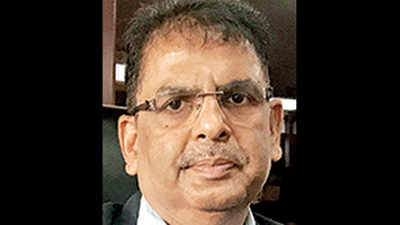- News
- City News
- Hyderabad News
- Hyderabad-based NFC plays key role in Nuclear-tech self reliance
Trending
This story is from September 23, 2020
Hyderabad-based NFC plays key role in Nuclear-tech self reliance
As India is on the verge of realising it’s next big plan of producing more green energy, the city-based Nuclear Fuel Complex (NFC) has made a significant contribution to the country’s first, biggest, and completely indigenously produced 700MWe pressurised heavy water reactor (PWHR) that has been set up in Gujarat.

Dinesh Srivastava
HYDERABAD: As India is on the verge of realising it’s next big plan of producing more green energy, the city-based Nuclear Fuel Complex (NFC) has made a significant contribution to the country’s first, biggest, and completely indigenously produced 700MWe pressurised heavy water reactor (PWHR) that has been set up in Gujarat.

Prime Minister Narendra Modi had on July 22 announced that the Kakrapar Atomic Power Plant-3 had achieved criticality, describing it as a ‘shining example’ of ‘Make in India’.Parliament was informed by Union minister Jitendra Singh on September 18 that KAPP-3 would be commissioned and operationalised in November this year.
“The message that we are delivering to the world is that India has achieved the level of maturing in PWHR technology,” NFC chairman and chief executive Dinesh Srivastava told TOI on Tuesday. “India has everything to manage more of the 700MWe PHW reactors that will come up, produce, and manufacture every component in-house. We are not dependant on any other country,” he said.
“When we are producing nuclear power for the needs of the country, what also has to be borne in mind is that the green energy produced should also be given at a competitive rate. So manufacturing costs for both present and future needs will be at the most economic level for all the components,” Srivastava said.
The Nuclear Power Corporation of India Limited (NPCIL) has set up 22 PHW reactors with 20 of them being 220MWe and two 540MWe reactors.
Initially, the reactors were set up with technology from Canada. But when the denial regime started, India started working towards self-reliance and produced the reactors on its own.

Prime Minister Narendra Modi had on July 22 announced that the Kakrapar Atomic Power Plant-3 had achieved criticality, describing it as a ‘shining example’ of ‘Make in India’.Parliament was informed by Union minister Jitendra Singh on September 18 that KAPP-3 would be commissioned and operationalised in November this year.
“The message that we are delivering to the world is that India has achieved the level of maturing in PWHR technology,” NFC chairman and chief executive Dinesh Srivastava told TOI on Tuesday. “India has everything to manage more of the 700MWe PHW reactors that will come up, produce, and manufacture every component in-house. We are not dependant on any other country,” he said.
At NFC, which comes under the Department of Atomic Energy, a new technology was developed for making the pressure tube for the reactor. The steam generator tube was also successfully developed as a substitute for what was an imported item. For the first time, a 37-elements fuel bundle was produced with a new design for the reactor. All this achieved and more components were designed and manufactured in-house, achieving improved technology and processing.
“When we are producing nuclear power for the needs of the country, what also has to be borne in mind is that the green energy produced should also be given at a competitive rate. So manufacturing costs for both present and future needs will be at the most economic level for all the components,” Srivastava said.
The Nuclear Power Corporation of India Limited (NPCIL) has set up 22 PHW reactors with 20 of them being 220MWe and two 540MWe reactors.
Initially, the reactors were set up with technology from Canada. But when the denial regime started, India started working towards self-reliance and produced the reactors on its own.
End of Article
FOLLOW US ON SOCIAL MEDIA










